Project Profile
Teaching Craft for Macromolecular Creativity
Louisiana State University A & M College
Abstract
This Integrative Graduate Education and Research Training (IGERT) award supports the establishment of a multidisciplinary graduate training program of education and research on the synthesis, characterization, processing and theory of macromolecules. Students in eight departments will participate in this IGERT experiment. After research-driven formal training in the above topical… more »
This Integrative Graduate Education and Research Training (IGERT) award supports the establishment of a multidisciplinary graduate training program of education and research on the synthesis, characterization, processing and theory of macromolecules. Students in eight departments will participate in this IGERT experiment. After research-driven formal training in the above topical areas, the students will join an interdisciplinary team including other students, faculty and off-campus participants. The research mix includes engineering plus curiosity-driven and applied science.
An Apprentice-Artisan-Craftsperson ladder is adapted from the trade arts to develop skills, creativity, ethics, responsibility and philosophy. Students will arrive early for a summer of research discovery and ethics training. Based on demonstrated merit, they will be elected to apprenticeships. Apprentices will work side by side with professors and off-campus “research master craftspersons” for 2 to 6 weeks-long enough to demonstrate first-hand the responsible and ethical conduct of research, but short enough that the student can still flourish independently.
Upon completion of a written report and advancement to Ph.D. candidacy, Apprentices become Artisans. Among other privileges and responsibilities, Artisans may write minigrants in support of original ideas. After a successful data defense, Artisans will be declared Craftspersons and become eligible for up to six months of “finishing school” at another university, government or industrial site. Excellent opportunities have been pre-arranged, but Craftspersons might design their own based on preliminary data from their independent minigrants.
The core curriculum will be revised to serve a more interdisciplinary clientele. Team-taught, integrated lab/lectures will pay special attention to practical skills, including those required for equipment building, programming and troubleshooting. Training in the ethical conduct of science and technology, plus business issues, will be provided in two courses available to graduate and undergraduate students across campus. Students must perform a community service project and participate in a new, interdepartmental seminar. A strong reward structure will maintain student and faculty interest in this demanding experiment. The member departments and off-campus participants will share their different strengths in gender, cultural and racial diversity. More than 30 students will participate overall. Successful aspects of the experiment will spread throughout the campus, guided by a new sociometrics project to assess its effectiveness.
IGERT is an NSF-wide program intended to meet the challenges of educating Ph.D. scientists and engineers with the multidisciplinary backgrounds and the technical, professional, and personal skills needed for the career demands of the future. The program is intended to catalyze a cultural change in graduate education by establishing new, innovative models for graduate education and training in a fertile environment for collaborative research that transcends traditional disciplinary boundaries. In the third year of the program, awards are being made to nineteen institutions for programs that collectively span all areas of science and engineering supported by NSF. The intellectual foci of this specific award reside in the Directorates for Mathematical and Physical Sciences, Engineering, and Education and Human Resources. « less
Contributions[?]
Project members' contributions to the library and showcase are listed here.






